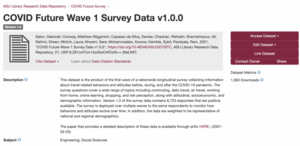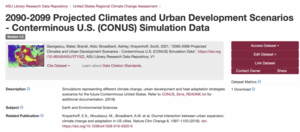Last October, just before releasing ASU’s Dataverse Research Data Repository, we ran a series of posts for Open Access Week 2020 and included one on FAIR and CARE of researcher datasets. The repository is now live and, while we are learning new things each day, our goal remains consistent: publish ASU research that is FAIR - Findable, Accessible, Interoperable, and Reusable. FAIR metadata helps computer systems find, access, interoperate, and reuse research data because of the sheer volume and rapidity with which researchers now produce data.
FAIR data sharing quickly became a community norm, supporting funder policies that include these leading principles -- requiring more advanced organizing of research data beyond just giving someone a download link and citation. Whether you’re publishing your data with ASU or disciplinary repositories that meet the FAIR data principles criteria, we can help you set up a working plan that keeps your data organized and documented to meet funder requirements for sharing and enhance discovery and reuse.
Recently published datasets
To highlight the discovery and reuse of ASU Research, here are a couple of recently published datasets on ASU Dataverse:

COVID Futures Wave 1 Survey Data dataset page
The COVID Future panel survey, a project to understand how people expect to change their travel behavior after COVID-19, released its first dataset in March 2021. The team from ASU and the University of Illinois at Chicago was one of the first to deploy dataset guestbooks, a key feature of Dataverse. Dataset guestbooks help a team provide access, and help inform how others are either interested or intend to use the data, aiding in relationship building between researchers. Additionally, it provides a data use agreement and data licensing statement. This dataset has already been accessed over a thousand times!

The United States Regional Climate Change Assessment dataset page
This month we published 2090-2099 Projected Climates and Urban Development Scenarios - Conterminous U.S. (CONUS) Simulation Data, a multi-decade climate projection into the year 2099 based on current scientific thinking. The team is sharing simulation data across the contiguous United States projected nearly a century into the future. At over 18 terabytes, this dataset is exponentially larger than all the collections the ASU Library published, combined, via our digital repository services over the past decade. The large uploads required the use of a special direct upload process using the Dataverse API, and team member Aldo Brandi worked with us to prepare the metadata and related publications references. One of the most important aspects of this dataset is the use of a readme file to enrich the metadata and provide a foundation for reuse. Readme information is now a recommended component for dataset publishing.
Working with the Library and ASU Research Data Management
The ASU Research Data Management team works towards creating accountability for publicly-funded research through long-term preservation actions that make your research ready for the future. Like journal articles, research data requires contextual information for discovery in conventional search engines, repository catalogs, and the library’s One Search. Our team will work with you to enrich the information for machine learning as well as human interaction. In the end, you’ll have a more long-lasting and accessible home for your research data.
If you are an ASU researcher and choose ASU Dataverse, submit a request via our request form and select ‘Request submission to Dataverse Research Data repository’. The library will get back to you within two business days to start the process, and we will share our readme file template to help guide you through the documentation and metadata required for FAIR publishing.
Contact us and get started today.
Matthew Harp
Research Data Management Librarian
